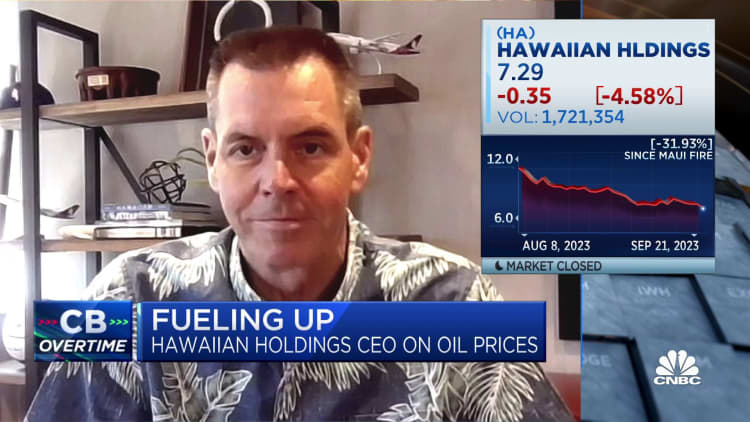[ad_1]
Alaska and Hawaiian Airlines planes takeoff at the same time from San Francisco International Airport (SFO) in San Francisco, California, United States on June 21, 2023.
Tayfun Coskun | Anadolu Agency | Getty Images
Alaska Air Group has agreed to buy rival Hawaiian Airlines in a $1.9 billion deal, setting up another potential regulatory battle in the second proposed airline merger in less than two years.
Alaska would pay $18 a share for Hawaiian and would take on $900 million of its debt, the companies said Sunday. Shares of Hawaiian Airlines closed on Friday at $4.86, giving the company a market cap of about $250 million. They’re down nearly 53% this year.
The airline has struggled with challenges including the Maui wildfires, increased competition from Southwest, which has ramped up service in Hawaii in recent years, and a lagging recovery of travel to and from Asia after the pandemic. Hawaiian has posted net losses in all but one quarter since the start of 2020, while Alaska and other carriers have returned to more solid financial footing as the pandemic waned.
“What we saw here was a unique opportunity in time at the valuation that we saw Hawaiian at,” said Shane Tackett, Alaska Airlines’ CFO, in an interview. He said the deal would also enable the combined companies to become a “market leader” in the premium-travel Hawaii market.
Carriers have faced strong opposition from President Joe Biden’s Justice Department in their efforts to combine to better compete with larger rivals. Earlier this year, the DOJ won a lawsuit to break up a regional partnership in the Northeast between JetBlue Airways and American Airlines.
The Justice Departments also sued to block JetBlue Airways‘ proposed acquisition of discount carrier Spirit Airlines. A trial is expected to wrap up in the coming days.
Four airlines — American, United, Delta and Southwest — control about 80% of the U.S. market. Hawaiian and Alaska said they expect the transaction to close in 12 to 18 months, subject to approval by regulators and Hawaiian’s shareholders.
The Association of Flight Attendants-CWA, which represents cabin crews at both airlines said it would evaluate the deal.
“Our first priority is to determine whether this merger will improve conditions for Flight Attendants just like the benefits the companies have described for shareholders and consumers,” the AFA said in a statement. “Our support of the merger will depend on this.”
The combined company will be based in Seattle, where Alaska Airlines is headquartered, and led by CEO Ben Minicucci.
The two airlines said they will keep each carrier’s brand but operate under a single platform, combining into a 365-airplane fleet covering 138 destinations.
Prior to pursuing Hawaiian, Alaska Airlines acquired Virgin America for $2.6 billion in 2016. Alaska operates Boeing 737s and it spent years whittling down Virgin’s fleet of Airbus planes to streamline its fleet. Purchasing Hawaiian would bring a complex mix of Boeing and Airbus jets, both narrow-body and wide-body planes under Alaska’s roof.
“With the additional scale and resources that this transaction with Alaska Airlines brings, we will be able to accelerate investments in our guest experience and technology, while maintaining the Hawaiian Airlines brand,” Hawaiian CEO Peter Ingram said in a news release.
The combination will allow Alaska Airlines to triple nonstop or one-stop flights from the Hawaiian islands to destinations throughout North America. It will also bring Hawaiian’s long-haul flying to and from Asia under Alaska’s umbrella. Hawaiian last year struck a deal to fly converted-cargo planes for Amazon.
Alaska Airlines said the deal should bolster earnings within the next two years with at least $235 million of “run-rate synergies.”
“We are fully committed to investing in the communities of Hawai’i and maintaining robust Neighbor Island service that Hawaiian Airlines travelers have come to expect,” Minicucci said in the statement.
WATCH: Maui tourism still not back to full strength since wildfires

[ad_2]
Source link



